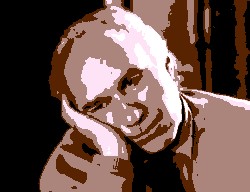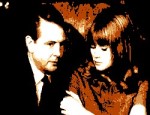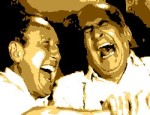Film Review

The film begins by showing how hopelessly disconnected the privileged classes are from the world around them. Whilst Paris burns, a pack of them descends on a country house, to divide the estate of an elderly relative who has just died (choosing the most inconvenient time to do so). Milou has the most to lose from his mother's death - he has lived in her house all his life and cannot imagine any other existence than the one he has led since he was a boy, reading poetry to the bees and catching crayfish with his bare hands. His relatives only see the house for its monetary worth and intend to sell it as quickly as they can, once they have shared out the dead woman's personal belongings. The first shock comes when it is revealed that Milou's mother has left a quarter of her estate to the housekeeper - from the reaction this causes you'd think western civilisation was about to collapse.
Things take a more bizarre turn when Milou's nephew, Pierre-Alain, shows up, having hitched a lift from a gregarious truck driver. Far from being traumatised by the dramatic events he has seen for himself in the real world, Pierre-Alain appears liberated and encourages his relatives to embrace the new era of solidarity and liberalism. A truce is called between the bickering family members and they enact what vaguely resembles an idealised form of the workers' paradise, cooperating with one another, sharing their resources and generally having a good time. The idyll is brutally shattered when a factory owner suddenly crashes onto the set with the news that the revolutionaries are heading their way. It is July 1789 all over again! Panic-stricken, Milou and his relatives take immediate flight and end up seeking sanctuary in a damp, miserable grotto. Of course, the threat is far less than they imagine, and once the half-hearted revolution has burned itself out things are soon back to normal. The old woman can be laid to rest and the money-grubbing nouveaux riches can return to their insular little lives, that eventful spring of 1968 no more than a vague memory.
One of the main charms of Milou en mai is the magnificent ensemble that Malle brings together for our enjoyment, a cast that includes established actors - Michel Piccoli, Michel Duchaussoy and Miou-Miou - and a host of new talent: Dominique Blanc, François Berléand and Valérie Lemercier. The English actress Harriet Walter is a welcome addition, as is Bruno Carette, a talented comedic actor who tragically fell ill with leukoencephalopathy and died shortly before the film was released, aged 33 (he plays the likeable truck driver). The part of Milou's deceased mother went to Paulette Dubost, a veteran performer whose career stretches back to the early 1930s; she went on working until she was in her nineties, and lived to the grand old age of 100. Piccoli, Duchaussoy and Miou-Miou were each nominated for a César for their performances, but the only one to win the award (in the Best Supporting Actress category) was Dominique Blanc, who has since come to be regarded as one of French cinema's finest actresses.
Despite his reputation as one of France's most eclectic filmmakers, Louis Malle made surprisingly few comedies - Zazie dans le métro (1960) and Viva Maria! (1965) being the only other two that readily come to mind. Malle is far better remembered for his serious dramas, intense works like Le Feu follet (1963) and Au revoir, les enfants (1987), and yet Milou en mai shows that he also had a natural flair for comedy. It is worth noting, en passant, that Malle scripted the film in collaboration with Jean-Claude Carrière, who also co-authored another memorable piece of bourgeois lampoonery, Luis Buñuel's Le Charme discret de la bourgeoisie (1972). After this, Louis Malle made only two more films, the erotic drama Damage (1992) and the inspired Chekhov adaptation Vanya on 42nd Street (1994), both of which are a world apart from the breezy delight that is Milou en mai.
© James Travers 2012
The above content is owned by frenchfilms.org and must not be copied.
Film Synopsis
May 1968. Émile Vieuzac, known to all as Milou, is a contented 60 year-old who lives with his mother in a grand country house in the southwest of France. He has never had to work for a living and he lives a peaceful existence, pottering about in the ample grounds of his house. When his mother dies suddenly, Milou summons his nearest relatives to attend the reading of the will and decide how to share out their inheritance. Milou is appalled when his brother, daughter and niece agree that the house must be sold, but this seems to be the only solution. Meanwhile, France is in a state of political turmoil owing to a series of student demonstrations and uncoordinated strikes. Just when Milou and his relatives have called a temporary end to their hostilities, they receive news that they may be the targets of an anarchist uprising. Fearing for their lives, they flee the house in a desperate panic...© James Travers
The above content is owned by frenchfilms.org and must not be copied.
Similar Films
Here are some other films you may enjoy watching:Other related links:
Film Credits
- Director: Louis Malle
- Script: Louis Malle, Jean-Claude Carrière
- Cinematographer: Renato Berta
- Music: Stéphane Grappelli
- Cast: Miou-Miou (Camille), Michel Piccoli (Milou), Michel Duchaussoy (Georges), Bruno Carette (Grimaldi), Paulette Dubost (Mrs. Vieuzac), Harriet Walter (Lily), Martine Gautier (Adele), Rozenne Le Tallec (Marie-Laure), Jeanne Herry (Françoise), Renaud Danner (Pierre-Alain), François Berléand (Daniel), Dominique Blanc (Claire), Serge Angeloff (Adele's fiancé), Anne-Marie Bonange (Neighbor), Marcel Bories (Leonce), Bernard Brocas (Le curé), Stéphane Broquedis (The young garage owner), Etienne Draber (Mr. Boutelleau), Diane Gracis (Young girl), Denise Juskiewenski (Mrs. Abel)
- Country: France / Italy
- Language: French / English
- Support: Color
- Runtime: 107 min
- Aka: Milou in May ; May Fools
The very best of the French New Wave

The very best of French film comedy

The very best sci-fi movies
